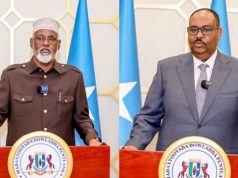Leadership, it is said, requires a fine balance of humility and hubris. Despite its splendid recovery, Somalia still is, sadly, a target of ridicule and hubris, an excessive pride that ancient Greeks scorned at as defiance of the gods (truth), leading to nemesis or doom. In a televised speech to the Uganda Annual Judge’s Conference (January 28, 2019), President Yoweri Museveni, rather brashly and un diplomatically, proclaimed that “Somalia is not a state” and hasno “organised authority.” The Ugandan leader did not feel morally, diplomatically or otherwise constrained to label Somalia as “stateless” despite not naming other countries with no organised authority “for diplomatic reasons”.
In a deep intellectual sense, Mr Museveni’s “stateless Somalia” remark echoes the cynical view of Africa conveyed by the polemical book, Africa Works: Disorder as Political Instrument (1999), where Patrick Chabal and Jean-Pascal Daloz dismiss the African state as “weak”, “vacuous”, “ineffectual”.
As the adage goes, people who live in glass houses shouldn’t throw stones. State failure, like beauty or ugliness, is in the eye of the beholder. In a 2006 book, Failed States: The Abuse of Power and the Assault on Democracy, Noam Chomsky presciently warned that the United States was becoming a failed state, and thus a danger to its own people and the world.
Mogadishu has ignored Museveni’s broadside. “We’re a state internationally recognised and that’s why I’m now here with my Kenyan counterpart”, said Somalia’s Foreign Affairs Minister, Ahmed Awad. Beyond the “failed state” polemic, Somalia is the poster child of an “Africa rising” from the ashes of civil war in the 21st century. The nation has come a long way from its dark days in the 1990s, captured in a newly published book, The Roots of the Somali Crisis: An Insider’s Memoir (2019) by Colonel Ahmed Omar Jess.
Jess, one of the key players in the events that led to the failure and withering away of the Somali State, insightfully captures Somalia’s unique challenge: “In contrast to the rest of Africa where states are struggling to become a nation, the Somali is a nation struggling to become a state.” (p.241). However, two reports this week highlight Somalia’s recovery. First, a January 28, 2019 report to the UN Security Council by the World Food Programme (WFP) and the Food and Agriculture Organisation (FAO) depicts Somalia as one of the few areas experiencing violence which have seen some improvements in food scarcity and improved security. In one year, the number of Somalis experiencing acute food shortages dropped by almost half from 3.3 million in July 2017 to 1.8 million in July 2018.
Second is a January 25, 2019 survey by the Washington-based Africa Centre for Strategic Studies (ACSS), “Progress and Setbacks in the Fight against African Militant Islamist Groups in 2018”, which shows that fatalities linked to al-Shabaab dropped by 15pc from about 4,700 in 2017 to 4,000 last year. Delightfully, the world’s most protracted refugee crisis might be slowly coming to an end. Last year, a total of 122,000 Somalis returned to Somalia from neighbouring countries, about three-quarters of them from the Dadaab refugee camp in Kenya.
Remarkably, Somalia’s recovery is a fine blend of internal reforms and a new global deal. Despite significant setbacks, Somalis are deepening their democracy. In the last 18 years, power has peacefully changed hands from five presidents and more than eight prime ministers to the respective winners.






